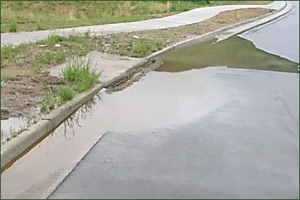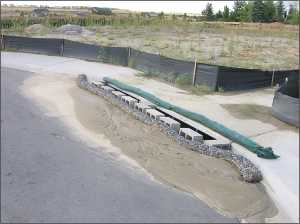Difference between revisions of "Construction: erosion and sediment control inspection and maintenance"
Jump to navigation
Jump to search
Kyle menken (talk | contribs) m |
Kyle menken (talk | contribs) |
||
| Line 4: | Line 4: | ||
At these inspections, keep an eye out for accumulated sediment, worn materials, compliance with the project's staging plan, and potential failure points. | At these inspections, keep an eye out for accumulated sediment, worn materials, compliance with the project's staging plan, and potential failure points. | ||
[[File:ESC ponding 2.png|300px|thumb|left|Ponding in front of this catchbasin indicates that this ESC inlet control is working. Ponding water allows for suspended sediments to settle. (Photo source: CISEC)]] | |||
[[File:ESC ponding 1.png|300px|thumb|right|This inlet control has worked well, but the sediment should be removed as soon as possible. (Photo source: CISEC)]] | |||
Revision as of 13:29, 2 August 2022
Erosion and sediment control inspection and maintenance[edit]
ESC measures require ongoing attention to ensure integrity and performance. ESC inspections should take place, at minimum, during installation, after rainfall events, and at the critical inspection points discussed in the Pre-construction: communication, inspection plan, and utilities coordination (section).
At these inspections, keep an eye out for accumulated sediment, worn materials, compliance with the project's staging plan, and potential failure points.

